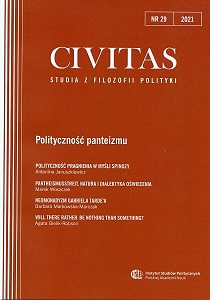Neo-monadyzm Gabriela Tarde’a jako model ekonomii politycznej XXI wieku
Gabriel Tarde’s Neo-monadism and Political Economy in the 21st Century
Author(s): Barbara Markowska-MarczakSubject(s): Metaphysics, Political Philosophy, Economic history, Labor relations, Political economy, Social Theory, Crowd Psychology: Mass phenomena and political interactions, Sociology of Culture
Published by: Instytut Studiów Politycznych PAN
Keywords: neo-monadism; liberal oicodicy; homo-oeconomicus; Tarde;
Summary/Abstract: The aim of the article is to construct a certain thought experiment using Gabriel Tarde’s concept of neo-monadism to rethink the foundations of liberal oikodicy. In this article, liberal oicodicy is understood as the concept of a social order based on the idea of a rational, autonomous individual (homo-oeconomicus) operating in the conditions of economic exchange (Vogl 2015). The recapitulation of the Leibnizian concept of monadism proposed by Tarde in the light of contemporary knowledge and its application to the social world allows us to state that such a model of subjectivity is insufficient to explain many – seemingly irrational – phenomena, such as populist (mass) movements or financial speculations, characteristic of the political economy of the 21st century.
Journal: Civitas. Studia z filozofii polityki
- Issue Year: 2021
- Issue No: 29
- Page Range: 79-103
- Page Count: 25
- Language: Polish

